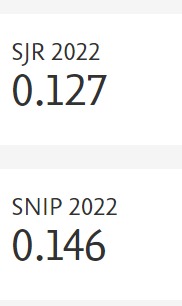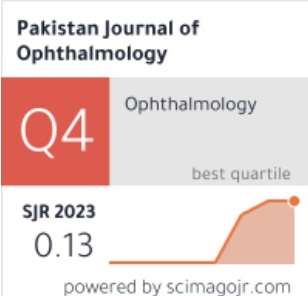Preliminary Results of UV ? A Riboflavin Crosslinking in Progressive Cases of Keratoconus, in Pakistani Population
DOI:
https://doi.org/10.36351/pjo.v27i1.520Abstract
Purpose: Keratoconus is a progressive non-inflammatory thinning disorder of the cornea which being a disease of young, has a significant psychosocial value. Corneal crosslinking with Riboflavin stops progression by increasing the strength of the cornea and has revolutionized the treatment of corneal ectasias at an early stage.
Materials and Methods: This is an ongoing prospective interventional single site study conducted in Armed Forces Institute of Ophthalmology, Rawalpindi, Pakistan.35 cases of more than 12 years with progressive keratoconus or any other corneal ectasia were included in the study after March 2006.
Results: The mean age was 17.71+4.6 years. 41.9% of the cases were males while 58.1% of them were females with a frequency of 13 and 18 respectively. Right eye was treated in 54.8% of the cases whereas left eye was treated in 45.2% of the cases with a frequency of 17 and 14 respectively. Mean preoperative BCVA was 0.53+/-0.36 which improved by at least one line in 61.29% of the cases, remained stable in 35.48% cases and deteriorated in 3.23% cases. Mean post-operative BCVA was 0.39+/-0.24.Pre-operative mean of steepest K reading (K steep) was 50.60+/-5.41D,which reduced to 48.85+/-6.11D (p< 0.001). The steepest K reading improved in 67.74% cases, remained stable in 25.81% cases and deteriorated in 6.45% cases. Two cases (6.45%) developed keratitis leading to corneal scarring.
Conclusion: Our study shows that CXL is a safe and effective procedure in stopping progression of corneal ectasias.






